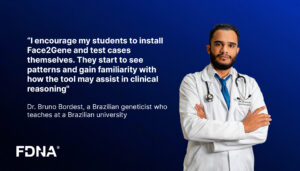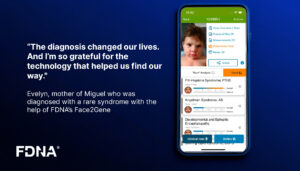October 21, 2015
During the ASGH15 Conference in Baltimore, MD, USA.L. this poster was presented by Basel-Vanagaite , S. Lyonnet, V. Cormier-Daire, M. Rio, J. Amiel, L. Wolf.
331 frontal images of Caucasian children with 43 different molecularly confirmed syndromes were analyzed. The molecularly confirmed diagnosis was listed in the first 20 matches for 89% of the cases, 10 for 75% of the cases, 5 for 69% of the cases, 2 for 54% of the cases and as the first result for 40% of the cases (Figure 2). Statistically, the chances of obtaining such results are virtually zero (p<1e-100). However, since some syndromes are more common than others, we ran permutation tests. Mixing the images and the diagnosis randomly, the rank 1 retrieval is less than 5%. The best results were observed for SHORT Syndrome, Kaufman Oculocerebrofacial Syndrome and Auriculo-condylar Syndrome 1 (100% correct 1st match). For microdeletion syndromes, the best performance was observed for Angelman Syndrome (listed in the first 5 matches in 93% of the cases) as compared to Williams Syndrome and 22q11.2 Syndrome (86% and 67%, respectively.). The team concluded that a system supported with FDNA technology can be useful for medical professionals researching and investigating genetic syndromes. Future applications include its usage to:1)guide targeted molecular testing; 2)complement next-generation sequencing-based molecular testing by inferring causative genetic variants from sequencing data.


